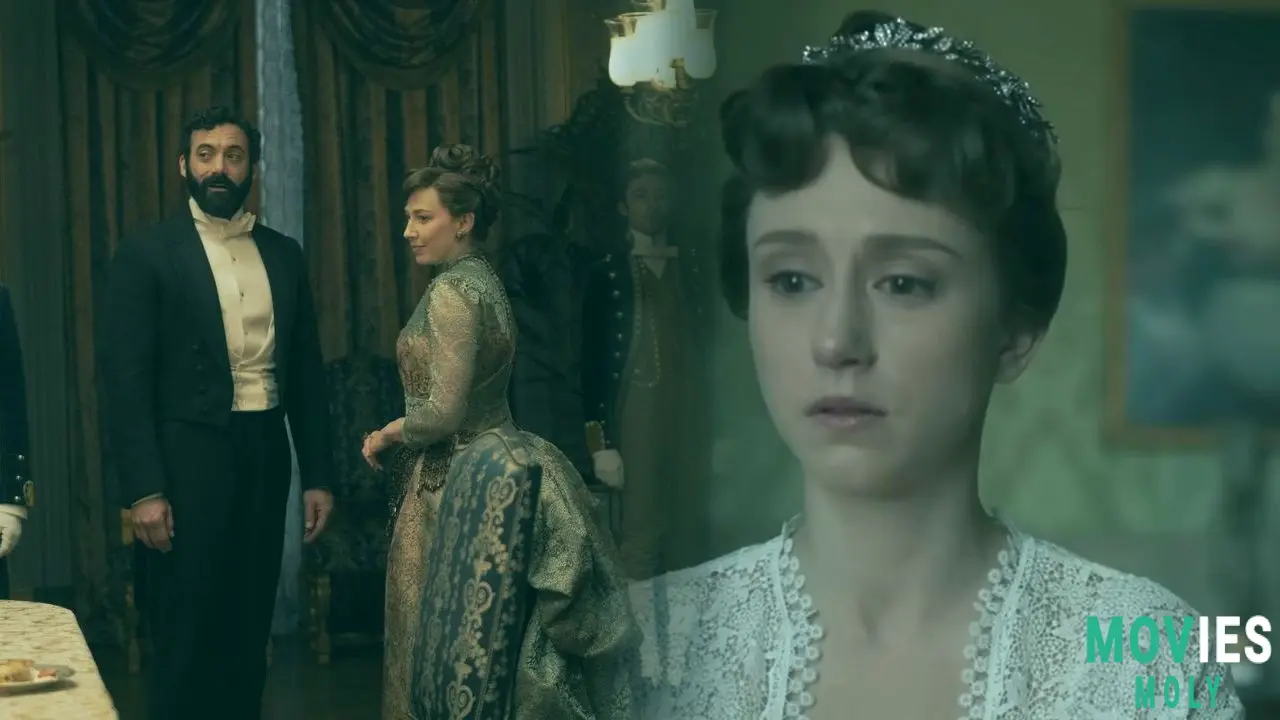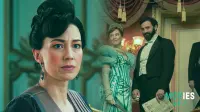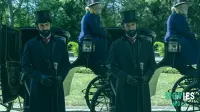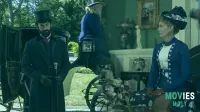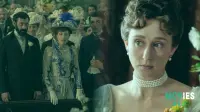There is little doubt that The Gilded Age is full of lavish displays and Bertha Russell's constant social rising. "Marriage is a Gamble," the fourth episode of Season 3, kept its promise by showing the long-awaited wedding of Gladys Russell (Taissa Farmiga) to Hector, Duke of Buckingham (Ben Lamb). The show was amazing, but I was grieved by the real cost of this "victory." This episode isn't just a summary of what happened; it's a clear example of how women had power or didn't have power in a time when status was more important than happiness.
Bertha (Carrie Coon) had been carefully planning this marriage since season 2, seeing it as the ultimate prize to bring her family to heights of society that no one else could imagine. But for Gladys, this big event was anything but happy. Her cries behind the veil, which some say were inspired by the actual Consuelo Vanderbilt's forced marriage, said a lot about how she felt. "Marriage is a Gamble" makes us face the hard truth that even the most successful people in the Gilded Age had to make huge personal sacrifices.
A summary of Episode 4: "Marriage is a Gamble" Important TimesThe episode didn't spend any time getting us ready for the wedding. Bertha was in charge, and Gladys stayed in her room and refused to help. This act of resistance was a strong protest, even though it didn't work. When Bertha's sister Monica (Merritt Wever) showed up, it was very different from what Bertha wanted to do with her life. Monica's lack of interest in the standards of high society, even in the way she dressed, showed how hard Bertha worked.
At the same time, other stories were going on. Ada Forte (Cynthia Nixon) was still having trouble with Luke's death, so she turned to spiritualism with Madame Dashkova (Andrea Martin), which Agnes (Christine Baranski) didn't like. Jack Trotter (Ben Ahlers) and Larry Russell (Harry Richardson) hit it big when they sold Jack's alarm clock invention for an incredible $600,000. This money alters Jack's life, but it also makes it hard for him to decide what to do next at the Van Rhijn household. Mrs. Astor (Donna Murphy) had to keep her daughter Charlotte from going to the wedding because of a scandal involving her and a rumored duel. This was to safeguard her own reputation. George Russell (Morgan Spector) was also under a lot of stress since JP Morgan (Bill Camp) withdrew out of their railroad contract, which put George's finances in danger.
Gladys was the most important part of the episode, though. George, Gladys's father, had promised her that she could marry for love at first, but in the end, he sided with Bertha, saying that backing out now would damage Gladys's name forever. George admitted he had "blown this," but he felt like he couldn't halt the unstoppable force of society. Gladys finally came out, marching down the aisle with tears flowing down her face. It was a very terrifying sight.
Gladys Russell's wedding: a forced marriage and what happened after
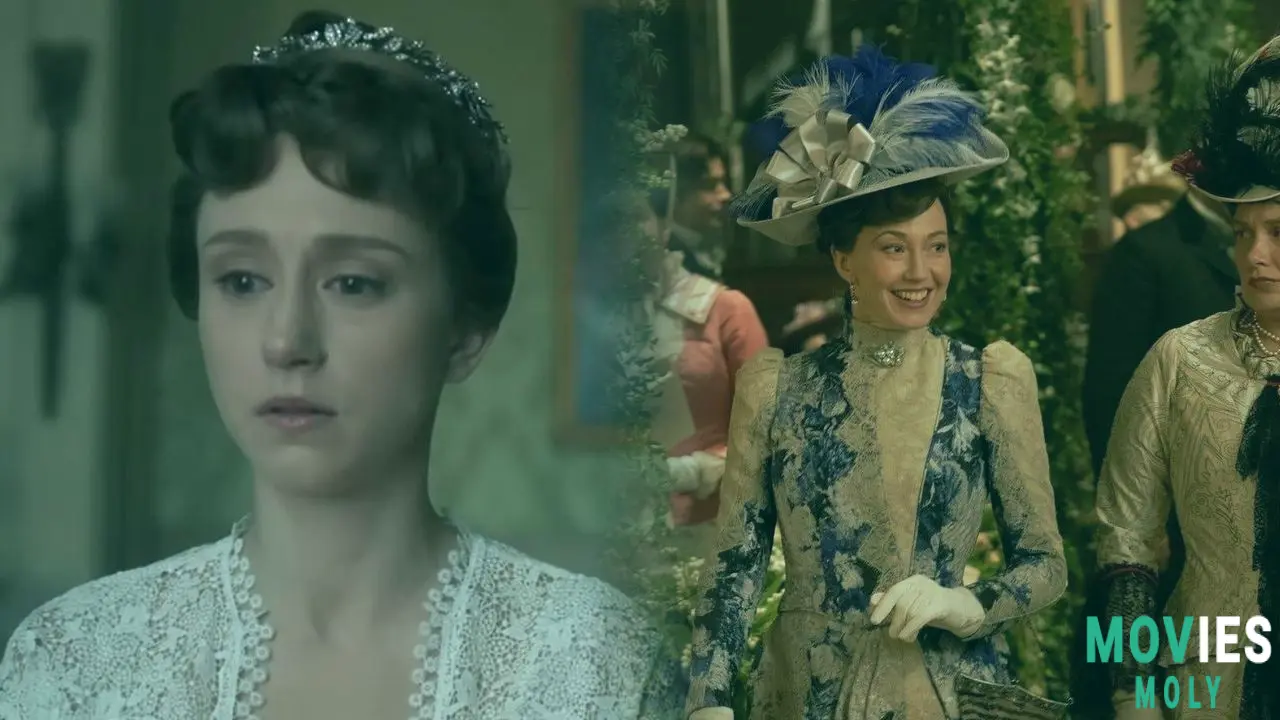
Gladys's feelings and future in England
Taissa Farmiga, who plays Gladys, has said that her character is at "rock bottom" emotionally. Billy Carlton's lack of effort to fight for Gladys wounded her heart, and she felt a lot of pressure from her mother and society. Farmiga said that Gladys was "completely empty and drained" at that point, and she cried as she walked down the aisle. I felt every bit of that hopelessness. It's hard to think of a more moving image than a bride crying on her wedding day, which shows how much she has lost her freedom.
Gladys and the Duke sail to England at the end of the episode. Their talk is difficult, which suggests that their marriage will be consummated. Even though this sequence was short, it made the union seem like a business deal. Taissa Farmiga said that Gladys will not be leaving the show and that her life in England will be explored. She also teased that Gladys will "find her footing" after hitting rock bottom. This symbolizes a journey toward freedom, even in the context of an arranged marriage.
The wedding of Gladys Russell was more than just a ceremony; it was a turning point for the whole Russell family. #TheGildedAge #Season3Episode4
Bertha Russell's Unstoppable Desire for Status
Bertha Russell's ambition knows no limitations. This wedding was the best thing she has done so far in her fight against old money in the "Opera War." Carrie Coon, who plays Bertha, has defended her character's actions by saying that Bertha really thinks she is giving Gladys "power, influence, impact," something Bertha herself could never truly attain. Bertha thinks of this marriage as an investment in her daughter's future, putting her in the European nobility. But her worst weakness is that she doesn't care about Gladys' sentiments and doesn't help her through the hard times.
There are no limits to Bertha Russell's drive. In Episode 4 of #TheGildedAgeS3, we saw the real cost of her big plans. What do you think? #GildedAge
George Russell's moral problems and money problems
George Russell was in a situation that was impossible. He told Gladys she could marry for love, but backing out of the Duke's engagement would have terrible effects for society. Morgan Spector, who plays George, termed the sequence where he tells Gladys it's too late "brutal" and "unfair," admitting that George had let his daughter down. This fight over Gladys's future is the first time that George and Bertha's strong bond has really been broken. George is under a lot of financial stress because JP Morgan backed out of his railroad contract. This made him fire Clay, his right-hand guy, because he didn't trust him.
The Gilded Age S3E4: Did George Russell really let Gladys down, or was he just trying to protect her reputation in a cruel world? #GildedAgeHBO
Larry and Marian's Engagement: A Love Match or a Business Deal?
In the middle of the Russell mess, Larry Russell asked Marian Brook (Louisa Jacobson) to marry him, and she said yes. Since season 2, their connection has grown off-screen, based on friendship and respect for each other. Larry wants a relationship like his parents' (ideally), and he likes that Marian is independent. But Bertha wasn't very happy about it because she didn't think Marian was important enough for her son. This new love connection is very different from Gladys's forced marriage, which could cause problems for Bertha in the future.
There was a lot of drama and changing loyalties in #TheGildedAge Season 3 Episode 4, from arranged weddings to new love. You have to see this! #GildedAgeEpisodes
Peggy Scott's Journey and Other Storylines Beyond the Russells
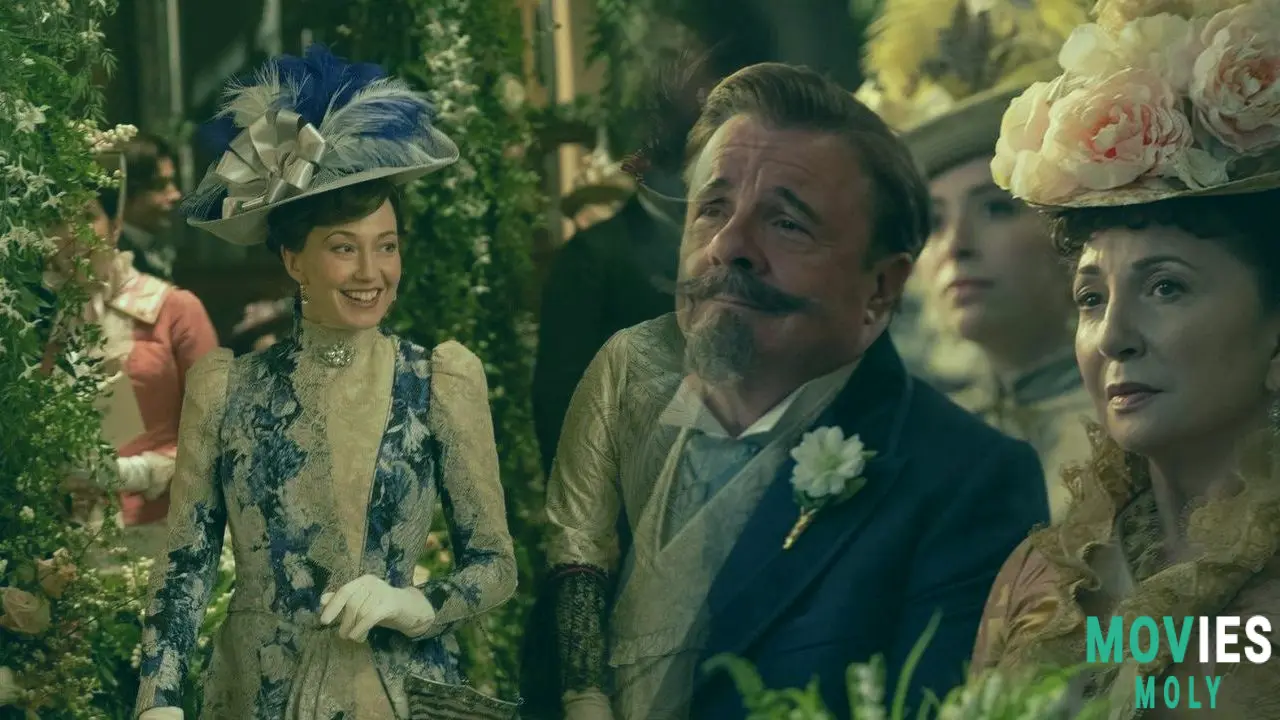
Peggy Scott's activism and problems with her family
Peggy Scott (Denée Benton) kept her interesting story going by talking about Jim Crow legislation and how people lost their right to vote after the Civil War. Dr. Kirkland's mother, Elizabeth Kirkland (Phylicia Rashad), is one of the people who consistently tries to stop her from reaching her goals as a writer and activist. She openly shows her bias against Peggy's work and history. Peggy's story shows how unfair the racial situation was at the time, and it is an important counter-narrative to the wealth of Fifth Avenue.
The Duke of Buckingham: A New Thing for Gladys
Duke Hector, played by Ben Lamb, has been a bit of a mystery. Gladys said she didn't like him, mostly because her mother had her marry him. Gladys, on the other hand, found a "tiny glimmer of hope" in Hector when they talked briefly before the wedding. He appeared honest and straightforward. This makes it seem like the Duke might not be the bad guy, even though the marriage is forced. This could make Gladys's connection in England more complicated.
Historical Context: What Happened in Real Life That Inspired Episode 4
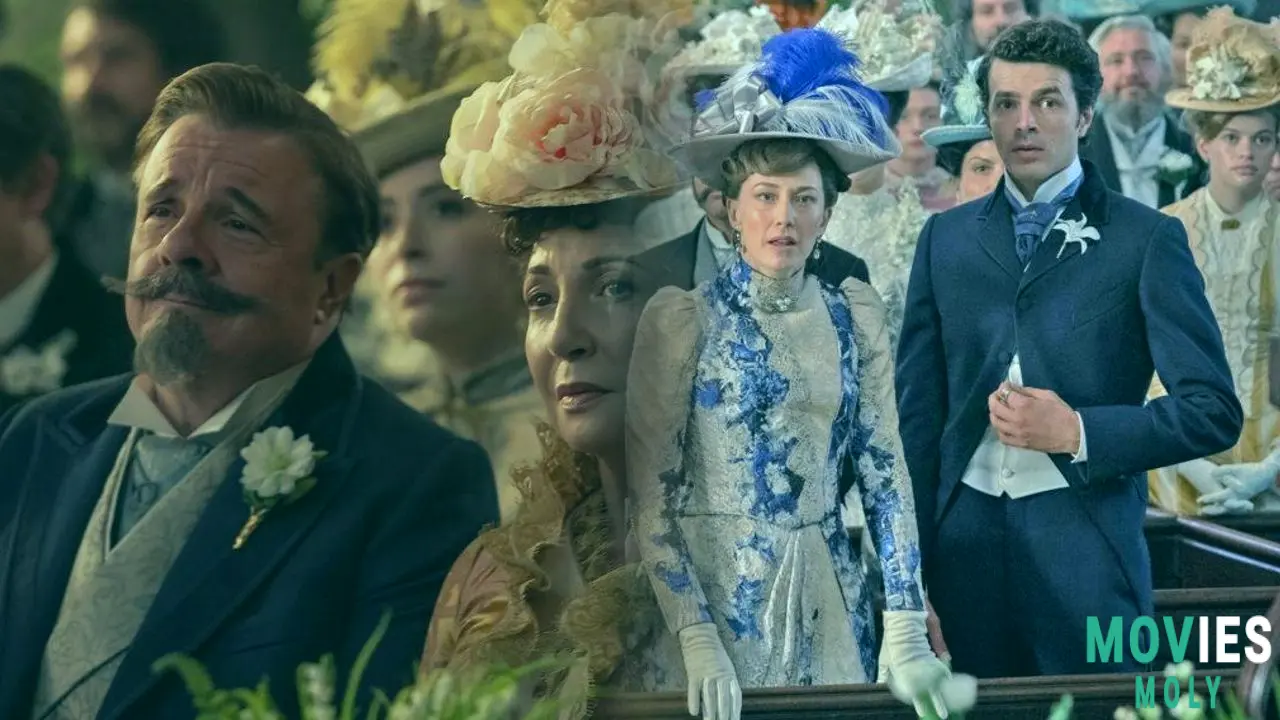
Connecting to the Vanderbilts: Truth and Lies
Julian Fellowes has said that The Gilded Age is based on real people and events from history. Gladys Russell's wedding to the Duke is the most obvious parallel in this episode. It is similar to the scandalous marriage of Consuelo Vanderbilt to the 9th Duke of Marlborough in 1895. Alva Vanderbilt, Consuelo's mother, was like Gladys in that she made her marry someone she didn't love. Reports say that Consuelo cried at the altar, and her mother eventually acknowledged to forcing her. Fellowes exploits these events, but he makes it clear that he is not "constrained to tell a 'Consuelo' story," which gives him the freedom to be creative.
This historical background gives the program more depth and reminds us that even though the Russells are made up, their issues with societal standards and the desire for status were very real for many families at the time. The show does a great job of using these historical echoes to make the characters' emotions more intense.
Thematic Analysis: Power, Choice, and Society's Expectations in the Gilded Age
Episode 4 does a great job of exploring the issues of power and agency, especially for women. Bertha uses her authority to get what she wants in social situations, thinking it's the only way for her daughter to be "truly free." Gladys, on the other hand, has no choice but to marry someone who would help her mother reach her goals. George's riches doesn't provide him much authority because of the rules of society and his wife's strong will. The episode shows that even a lot of money couldn't buy personal independence or get away from the strict rules of Gilded Age society.
The difference between Gladys's destiny and Larry and Marian's engagement makes these themes even stronger. Larry and Marian are trying to find love, but Gladys is stuck because of her responsibility. This is a frequent problem for "dollar princesses" of the time who sold American money for European titles. The Gilded Age is all about the conflict between what people want and what society expects of them.
What Episode 4 Means for Season 3 of The Gilded Age
What to Expect from Future Gilded Age Episodes
Gladys's wedding is a big turning point that sets up the second part of season 3. Her time in England as a Duchess, where she might have to deal with problems from Hector's sister Sarah, will be a big part of the story. The gap between George and Bertha is going to grow, especially because George's money problems with the railroad are getting worse. Bertha will definitely be watching Larry and Marian's engagement, and it is still unclear if she will accept Marian even if she doesn't have a lot of status. Peggy's activism and her relationship with Dr. Kirkland will continue to deal with the biases of the day. I think that as these characters deal with the effects of their decisions and the changing environment around them, their family fights and personal problems will get worse.
Our Review of "Marriage is a Gamble" and What We ThinkI thought "Marriage is a Gamble" was a very good episode, maybe even the best of the series. The mix of anxiety and exhilaration I felt during the wedding really messed with my head. The filmmaker did a great job of showing Gladys's helplessness by muting the sound and having her cry through her veil. Taissa Farmiga's performance was very powerful since it showed how numb and hopeless Gladys felt.
Some people would say that the wedding's rapid resolution was too quick, but I think it did a good job of showing how strong Bertha is and how quickly, and often brutally, arranged weddings happen. The different storylines, like Jack's success with money and Peggy's persistent fight against discrimination, fit together beautifully and set the stage for the second half of the season. This episode had a deep dive into the historical similarities and emotional depths of its characters, so you have to watch it.
Episode 4 of Season 3 of #TheGildedAge wasn't just a rehash; it went into great detail into the characters' emotional and historical similarities. #TVRecap
Great acting in Episode 4
The episode's emotional center was Taissa Farmiga's performance as Gladys. It was very impressive how she could show such deep despair and resignation with so little conversation. Carrie Coon was still a strong presence as Bertha, showing how strong the character's belief was that her actions are for the greater good, even when they hurt others. Morgan Spector's George also shone out; you could feel his shame and inner anguish as he tried to deal with his untenable situation. The ensemble group really brought the emotional stakes of "Marriage is a Gamble" to life.
Common Questions About The Gilded Age S3E4Did Gladys Russell marry the Duke in Season 3 Episode 4 of The Gilded Age? In "Marriage is a Gamble," Gladys Russell did marry Hector, Duke of Buckingham.
What made Gladys Russell cry during her wedding? Gladys was crying because her mother, Bertha Russell, compelled her to marry the Duke for social position, even though Gladys wanted to marry for love.
Is the wedding of Gladys Russell based on a real event? Yes, it is very similar to the real-life arranged marriage of Consuelo Vanderbilt, an American heiress, to the 9th Duke of Marlborough.
What happened to the clock that Jack and Larry made? Jack Trotter and Larry Russell sold the patent for Jack's alarm clock idea for $600,000.
What's next for Gladys Russell? Gladys will start her new life as a Duchess in England, and future episodes will show how she adjusts and tries to have more control over her husband.

